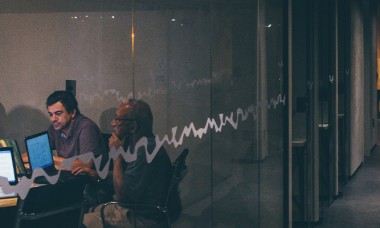Why this digital transformation wave is the biggest we've ever seen
What does a digitally transformed world look like?
It’s a question worth asking. With all of the effort and investment organisations are currently making to transform their operations for a new digital world, it would be nice to have some idea of where we’re all headed, both in the sectors we work in and as a society.
There’s one thing for sure. According to Mark Cameron, CEO of W3.Digital, the change we’re going through right now is ‘orders of magnitude’ greater than comparable waves of technology change we’ve experienced – and in particular, the flourishing that happened post-GFC.
“The GFC was massive in terms of technology. It set the platform for organisations like Google and Facebook to exist, for Apple to become the world’s largest company. The impact on the world economy was enormous and it continues to have really large ripples.
“This time is orders of magnitude larger. The reason being, we’re not just talking about the customer. It’s all aspects of a business. Every single part of the economy is being digitally transformed. There’s a whole range of technologies that are all maturing at once,” he says.
Speaking to ReadyTech CEO Marc Washbourne on a brand new episode of the Ready Podcast, Mark gives examples of new innovations like biotech and 5G. Likewise, he says AI is moving out of the realm of theory and into day-to-day practice for today’s businesses.
“Whole categories of technology have matured to the point where they are now having fundamental impacts on organisations - when you put them together they are having impacts on both organisations and on whole sectors of the economy,” he says.
What's the history of digital transformation?
The GFC was the catalyst for the last wave of digital and technology investment. At the time, Mark says the biggest problem that most businesses had was how to find, engage and retain customers, following the ‘explosion’ that occurred in the traditional media landscape.
“There used to be TV, radio and newspapers. You’d do some creative, push stuff out, and get a customer. But that was no longer the case. How businesses find customers became more difficult, with the growth of things like social media, YouTube and search.”
The answer for organisations was to hone in on what they knew about their customers, and speak to them in a more personalised way to bring more customers in. It was an answer that drove growth in CRM marketing automation and technologies around social media.
“At a corporate strategy level, the thinking became around having more of a customer-centred strategy. Beforehand, you didn’t have to do that. As a result, you were seeing information gathering was driving new insights and new ways of thinking,” Mark says.
Mark says finding, engaging and retaining customers is now a known problem, where if you “throw a certain amount of money at it you know what you get out the other end, more or less”. That is different from the economic shift happening now with Covid’s impacts globally.
“The challenges now are how to find, engage and retain talent, and how to get more revenue out of the customers we already have – revenue diversification. That comes back to your business model, it’s more fundamental to the way that businesses operate.”
“It’s still key to focus on customer experience and understanding. But that’s really table stakes, or you get wiped out. The new competitive landscape is employee experience, how you can come together to create new product offerings and ways of doing work.”
What's the future of digital transformation?
Where is this new bigger wave of transformation heading?
Given the complexity, Mark says it is very hard to say what a digitally transformed world looks like. But one thing he can say is that things are going to be a lot more autonomous than they are now, singling out the possibility of future automated decision making.
The combination of network decision making and AI could mean that as huge amounts of data is crunched by analytics and transformed into insights, the operations and the activity of an organisation could be made transparent to the right person at the right time.
“It would be the dream of any CEO to be able to talk to a digital assistant and say what are four things they need to focus on today? Across all parts of the organisation - these are the four things. The same could be possible for every other person in that organisation.”
What about the world of the customer? That’s where we get into the recently popularised idea of a metaverse - and the competing technology world views that come as a result.
“The idea of a metaverse is one of the most dystopian things I’ve ever heard in my entire life. What we're saying is the world is kind of scary, we are going to create a place for you to go and escape from it, and spend more time in a digital environment than you currently do. And while you’re there, we’ll market to you relentlessly. That doesn’t sound really attractive to me and doesn’t seem like it will be helping humanity flourish in any particularly interesting way.”
Mark argues the best future for technology will be where technology essentially disappears in the background. He argues Apple’s direction of R&D spending into digital assistant Siri as well as being a trusted ‘bank of data’ for people could create more interesting possible futures.
“Digital assistants could help you make better decisions on a day-to-day basis, support you in driving interesting experiences – and it’s all happening in the background. You’re not inside the environment but it nudges you, saying you might want to maybe make this decision now, or over here because there’s someone you might want to meet. You could have a highly integrated digital world where everything is working together but in many cases is invisible."
For more of Mark Cameron’s views on digital transformation as well as how to do it well, listen to the full podcast episode here. Be sure to like, share and subscribe!






